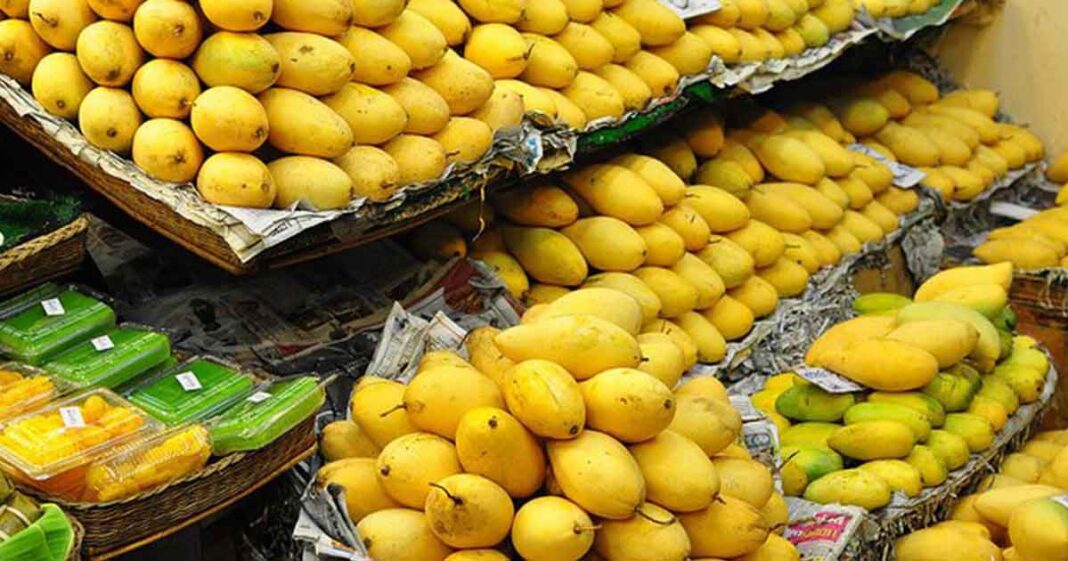SHANGHAI: “In recent years, China has become the largest market for export of food products from Pakistan. Exports of food products from Pakistan to China were close to $1 billion in 2022. We look forward to the increased presence of Pakistani mangoes in China,” highlighted Hussain Haider, Consul General of Pakistan in Shanghai at a webinar on the promotion of Pakistani mango on Monday.
The webinar was held by the Consulate General of Pakistan in Shanghai in collaboration with the Trade Development Authority of Pakistan (TDAP) and chaired by Nawab Ali Rahoojo, Deputy Consul General. More than 5 Pakistani mango export enterprises and 5 Chinese mango import enterprises attended the webinar.
On the occasion, Mahmood Nawaz Shah, Senior Vice President of Sindh Abadgar Board and director marketing, said that “Pakistani mangoes are very popular in Middle Eastern countries. We hope that more Chinese customers will love Pakistani mangoes.”
In 2018, Pakistan produced 1.9 million metric tons of mangoes annually, ranking sixth in the world. However, the country’s mango production has declined over the past 5 years, a phenomenon mostly blamed on global warming.
Mahmood told Gwadar Pro that the mango orchards are currently in well bloom, and a good yield of 1.7 million tons from the mango season is expected.
Pakistan exports about 150,000 tons of mangoes a year. However, its export volume lags far behind production.
“China is the world’s second largest economy with a great potential, which should be fully tapped,” added Mahmood.
Pakistan’s export of fresh or dried mangoes (commodity code 08045020) to China was $55,605 in 2022, down from $127,200 in 2021, while in terms of volume it was 23.95 tons in 2022 and 37.42 tons in 2021, accord Businesses boom across China, Mongolia border
HOHHOT: With visible excitement, Ulantuya, who comes from Mongolia, went on a shopping spree in a bustling mall in Erenhot, a major city on the China-Mongolia border.
“There is such a variety of products here. I will be taking many things home,” Ulantuya said amid a swarm of Mongolian merchants and customers.
Border cities like Erenhot have seen a boom in business and greater interpersonal exchange since cross-border travel resumed between China and its neighbors on Jan 8, as a result of optimized COVID-19 controls.
Zhang Yuan, who has had a leather goods shop in the mall for 12 years, was delighted to have Mongolian merchants return.
“As I reconnected with old friends, warm greetings were exchanged and our handshakes lingered just a tad longer than usual,” Zhang said. Statistics from the commerce department of the Inner Mongolia autonomous region showed that the Erenhot highway port has recorded a daily average of about 600 passenger trips since Jan 8. The port also handled 1.42 million metric tons of cargo last month, up 98.2 percent year-on-year.
Ceke Port, which is located in the Alxa League in Inner Mongolia, is an important cross-border channel for mineral products. At a worksite in Ceke, Mongolian containers brimming with coal were hoisted onto waiting trucks before being shipped to various corners of China.
–The Daily Mail-China Daily news exchange item ing to General Administration of Customs of China (GACC).
Victor Luo, CEO of Sanlian International Company (Pvt) Ltd, who exports Pakistani mangoes for 4 consecutive years, said, “last year’s severe floods reduced mango production and quality, the epidemic limited shipping capacity, and complicated inspection and quarantine procedures led to a decline in mango exports to China.”
Victor explained that over the past few years, the quality of Pakistani mangoes, including taste, appearance and size, has been favored by high-end mango consumers in China.
“Mango sales are not a problem, as the company’s first 2 tons of mangoes that arrived in China last year have been snapped up at the Chinese airport.” he stated.
“This year we will experiment with larger scale units for transportation and enhanced protection of outer packaging.” concluded Victor. –Agencies





